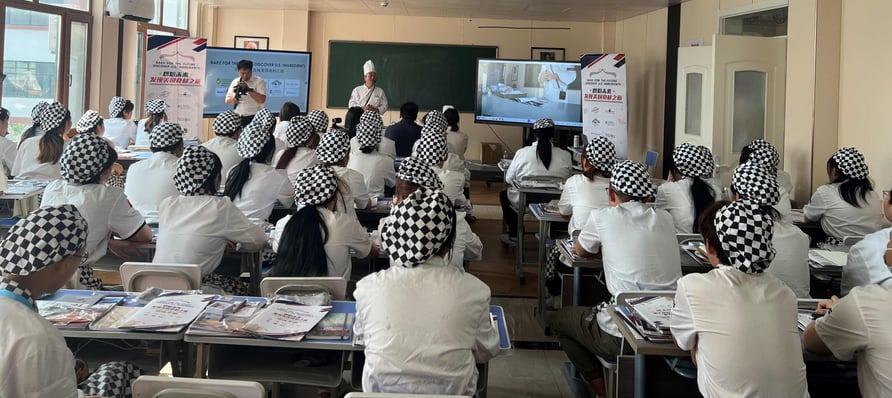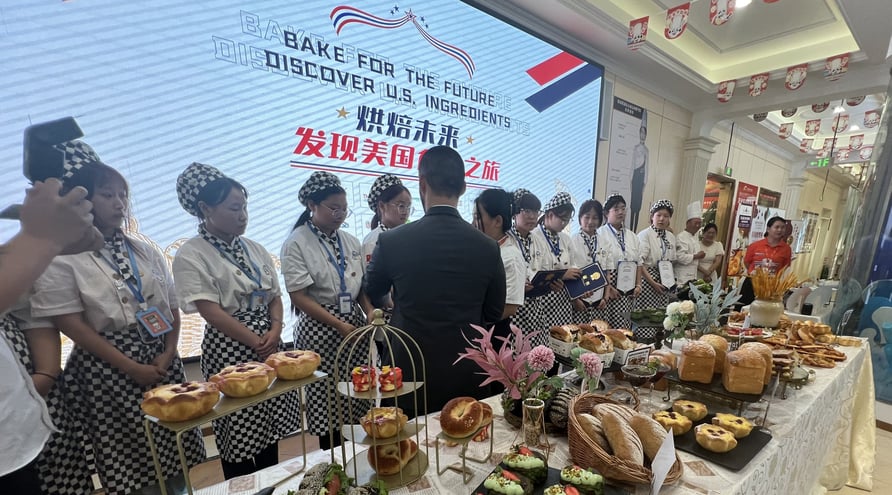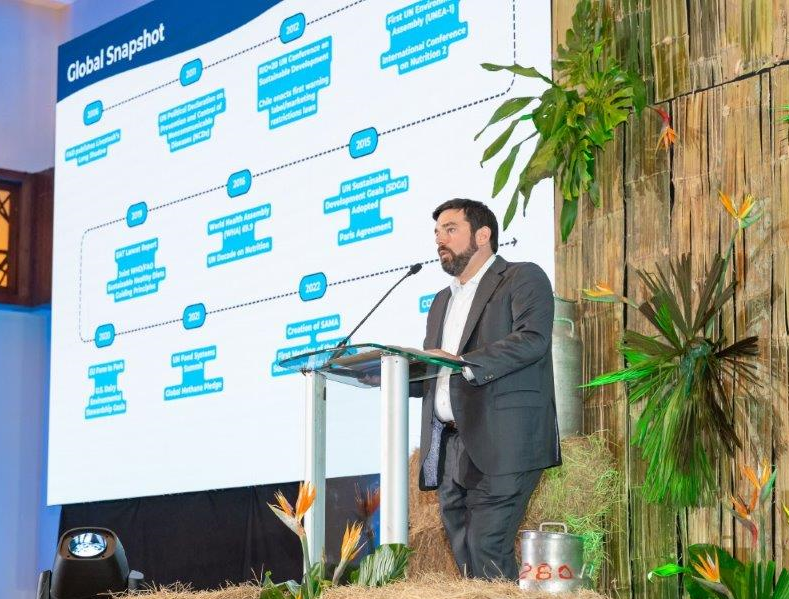HIGHLIGHTS: September 6, 2024
• Aspiring bakers in China learn the advantages of U.S. dairy ingredients
• U.S. dairy ingredients also touted in China for their convenience foods potential
• Agreement secures U.S. exporters' rights to use common names in Chile
• Gardner speaks at FEPALE conference
• Codex chair visits USDEC office
• July was a good month for U.S. dairy exports
• Morris to update state ag commissioners on Indonesia outreach project
• Register now for USDEC booth space at 2025 FISA Show
• Market Summary: GDT slips on WMP decline
• Morris moderates IDF webinar on government carbon-pricing policies
• USDEC makes 101 Export Guide document updates in August
Featured
Aspiring bakers in China learn the advantages of U.S. dairy ingredients
USDEC recently took part in a comprehensive three-day training program in Harbin, China, organized by the U.S. Agricultural Trade Office (ATO) Shenyang. The focus of the program was to educate students on the utilization of U.S. ingredients, including dairy permeate, in bakery applications.
Chef Han, a talented bakery chef whom USDEC collaborated with previously, led the training sessions, sharing his expertise in incorporating U.S. dairy permeate into various baked goods. Throughout the program, Chef Han not only provided valuable insights but also conducted engaging demonstrations for the students.
During the training, a total of 10 delectable bakery items were crafted, with five of them featuring U.S. dairy permeate in their dough compositions. From bagels and desserts to pizzas and different types of bread, the students had the opportunity to explore the versatility and advantages of incorporating dairy permeate from the U.S.
This marked the first bakery training initiative by USDEC in the northeastern region of China, with plans already underway for another session there later this month. The ongoing bakery program has successfully trained over 60 aspiring bakers, effectively raising awareness about the numerous benefits of utilizing U.S. dairy permeate in bakery creations.

Chef Han shared his expertise in incorporating U.S. dairy permeate into various baked goods.

ATO Director Ryan Bedford gave closing remarks and presented certificates to the young bakers at the training's completion.
U.S. dairy ingredients also touted in China for their potential in convenience foods
Last week, USDEC delivered a presentation on the advantages of U.S. dairy ingredients at the Chinese Institute of Food Science and Technology’s 24th Convenience Food Conference in Kunshan, Jiangsu Province.
USDEC China Representative Chang Su spoke to about 80 food professionals on the innovative possibilities of incorporating U.S. dairy protein and permeate ingredients into a variety of convenient, ready-to-eat foods.
Several convenience food prototypes developed through our collaboration with China’s Jiangnan University were featured, including noodles made with U.S. dairy protein, flavorful seasonings like vinaigrette and fish-flavor sauce, and instant soups utilizing U.S. dairy permeate.
This demonstration highlighted the great potential of U.S. dairy ingredients to enhance nutritional profiles, improve product quality, and cater to evolving consumer preferences. From boosting protein levels and quality in noodles to reducing sodium content and enhancing flavor in soups, U.S. dairy ingredients offer a versatile and beneficial solution for food manufacturers.
As the convenience food market in China evolves to meet diverse consumer needs, U.S. dairy ingredients can play a vital role in driving innovation and product excellence.

USDEC China Representative Chang Su enthusiastically covered the innovation potential of U.S. dairy ingredients in a variety of convenient, ready-to-eat foods.

Food professionals at CIFST’s Convenience Food Conference were eager to take in information about U.S. dairy ingredients.
Landmark agreement secures U.S. exporters’ rights to use common names in Chilean market
The Chilean National Congress has approved an agreement that safeguards the rights of U.S. cheese and meat exporters to use certain common names – such as “parmesan” and “prosciutto” – to market and sell their products in the Chilean market. The Consortium for Common Food Names (CCFN) and USDEC worked extensively with the U.S. government to secure this result.
The agreement came together following an exchange of letters between U.S. Trade Representative Katherine Tai and Chile’s Undersecretary of International Economic Relations Claudia Sanhueza on June 21, which confirmed a mutual understanding and agreement that U.S. exporters will be able to continue to market their products in Chile using a number of common cheese and meat terms.
"CCFN applauds the Administration for their initiative to negotiate the protection of parmesan and a number of other key products,” said Jaime Castaneda, executive director for CCFN. “We greatly appreciate USTR and USDA’s work with the Chilean government and urge the Administration to continue its efforts to push back against the European Union’s strategic monopolization of common names.”
The agreement will enter into force 90 days from the National Congress’ Sept. 3 approval.
Gardner speaks at FEPALE conference, highlights need for dairy voice in international discussions on food guidelines
Nick Gardner, USDEC senior vice president, Sustainability and Multilateral Affairs, spoke at the 17th Pan American Milk Congress held by the Pan American Dairy Federation (FEPALE) last week in Panama City. The high-profile event attracts dairy leaders from throughout the Americas and Caribbean to network and learn about the most important issues facing the industry.
Gardner’s presentation, “Politics in international organizations: What alerts are there for the dairy sector?” provided an update on the multilateral organizations setting global food and agricultural policies and recommendations that could impact dairy farming and processing around the world—from production to manufacturing to packaging to labeling to marketing to trade.
Gardner provided a rundown of upcoming meetings and issues currently under debate by organizations like the World Health Organization, the Food and Agriculture Organization, the Codex Alimentarius Commission, and the UN Environment Programme. He outlined issues being debated and what’s at stake for the dairy industry. He also called on FEAPLE members to ensure their governments are engaging in these forums to promote dairy consumption, advance science-based policies and encourage solutions that unlock the power of trade to deliver sustainable food systems.
USDEC has been building ties for years with dairy groups around the world to generate consensus and speak with a stronger voice to our respective governments about initiatives and proposals being pushed in the UN that could impact dairy production and consumption. In addition to making the case for increased cooperation, Gardner used his time at the meeting to strengthen USDEC’s direct relationship with FEPALE, as well as many of the Latin American dairy organizations and companies with which USDEC routinely collaborates.

Nick Gardner provided an update on the multilateral organizations setting global food and agricultural guidelines that may potentially impact aspects of dairy farming and processing around the world.
Codex chair visits USDEC office for FICC meeting
On Wednesday, USDEC’s Nick Gardner, on behalf of the Food Industry Codex Coalition (FICC), welcomed Codex Chairman Steve Wearne to USDEC offices in Arlington, Virginia.
USDEC and Gardner (who serves as FICC coordinator) work with other food and ag industry representatives within FICC to protect Codex’s commitment to science-based decision making, risk assessment, transparency and participation by all relevant stakeholders. That commitment is under increasing pressure by certain international stakeholders seeking to advance their national or regional trade agendas, trying to push Codex beyond its scope and mandate, and/or undermining other foundational Codex values.
The 1.5-hour meeting covered a lot of ground, including progress of the Codex strategic plan, sustainability, the role of WHO in Codex, previous and upcoming influential Codex meetings, and the Codex chair transition happening in December.
The meeting is the latest example of USDEC’s ongoing Codex leadership, which includes regular engagement with U.S. government and U.S. Codex Office officials to deliver positive outcomes for U.S. dairy exporters. (see Global Dairy eBrief, 1/19/24).
July was a good month for U.S. dairy exports
After a modest first half of 2024, U.S. dairy exports surged in July, posting their strongest growth in a year and a half with a 9.6% increase year-over-year in milk solids equivalent terms (MSE).
Unlike prior months where only cheese and high-protein whey saw significant growth, July saw gains across multiple categories. Low-protein whey, after lagging in 2023, grew 27% (+8,864 MT), marking its fourth consecutive month of growth. NFDM/SMP increased by 11% (+7,075 MT), while cheese and high-protein whey grew 10% (+3,516 MT) and 23% (+1,310 MT), respectively.
July's strong growth is partly due to weaker comparisons to last year, with July 2023 being the weakest month of the year. But even with that, the month was positive. Low-protein whey trade has grown for four straight months to China and 10 out of the last 11 months to Southeast Asia. Cheese sales to Mexico soared despite a weaker peso, and WPC80+ sales continue to expand in both established and emerging protein markets.
Learn more in this blog post.
Events
Morris to update state ag commissioners on Indonesia outreach project
USDEC Executive Vice President of Trade Policy and Global Affairs Shawna Morris is scheduled to speak at the National Association of State Departments of Agriculture’s (NASDA) yearly pre-annual meeting session with the Foreign Agriculture Service to address USDEC’s enhanced engagement with Indonesia, including the development of a technical cooperation program between the U.S. and Indonesia.
The project was launched following USDEC President and CEO Krysta Harden’s participation in a NASDA trade mission last summer. Harden was invited as the sole private sector representative to join agricultural secretaries and commissioners from various states on the mission. Based on the discussions held during that trip, Harden determined that more work was needed to provide assistance to Indonesia’s dairy sector in order to deepen our relationships with their industry and government. The project has since grown to incorporate both a technical collaboration element and direct work with the Indonesian government to position U.S. dairy as an optimal complementary milk powder supply source for the incoming president’s soon-to-launch nationwide school milk program.
The primary objective of the technical engagement prong of the project is to positively impact small to mid-sized dairy farmers in Indonesia, equipping them with essential knowledge to enhance farming practices and profitability. With the support of academic and state government partners, such as the New Mexico Department of Agriculture and New Mexico State University, substantial progress has been made in creating a comprehensive repository of resources. The availability of a resource library will streamline the assistance provided to other markets seeking aid for their small to mid-sized farmers. To complement that, the Wisconsin Department of Agriculture and NASDA have also collaborated with USDEC on arrangements for a reverse trade mission to the World Dairy Expo in Madison, Wisconsin, Sept. 29 – Oct. 4.
Strengthening the capabilities of Indonesia’s small to mid-sized dairy farmers will help support a pledge made by Indonesia’s new president to provide nutritious meals and milk to all Indonesian school children. It will also encourage overall demand for dairy products. This initiative will position USDEC to extend support to similar programs on a global scale.
USDEC Senior Vice President of Market Access and Regulatory Affairs Jonathan Gardner will travel to Indonesia later this month to further develop USDEC’s Indonesia technical engagement program.
Register now for USDEC booth space at 2025 Food Ingredients South America (FISA) show
USDEC Ingredients Marketing invites members to register for a spot in the USDEC booth at next year’s Food Ingredients South America (FISA) trade show, which will be held August 26-28, 2025, in São Paulo, Brazil. With eight exhibit spaces available for U.S. dairy ingredient suppliers to reserve, the show offers the opportunity to demonstrate U.S. dairy’s strong commitment to the market. There is no fee to participate, and spaces will be allocated on a first-come, first-served basis.
Through USDA RAPP funding, USDEC exhibited at this year’s FISA show (see Global Dairy eBrief, 8/16/24) and secured space to exhibit again in 2025. This year’s show saw record attendance and a growing exhibitor presence at what is billed as “‘The largest food and health ingredients event in South America.”
There has been consistent and growing interest from U.S. dairy ingredient suppliers to leverage this platform to connect with customers in the market.
To indicate your interest in exhibiting, please contact Keith Meyer at kmeyer@usdec.org.
Market Summary
GDT slips on WMP decline
The Global Dairy Trade (GDT) Price Index declined 0.4% at the Sept. 2 auction, as WMP ran counter to expectations and fell 2.5%. SGX-NZX futures markets heading into the event pointed to a rise of more than 3.5% for WMP, building on the momentum of recent weeks (WMP was up 11% over the previous two auctions). This week sent the average winning price to US$3,396/MT (which is still on the higher end of the 18-month price range despite the drop).
The decline of WMP this week can’t be blamed on China. The country reemerged as a buyer at the previous auction, and one of the big questions heading into Sept. 2 was whether they’d stick around after months of tepid demand (interrupted by an occasional buying spike). China did indeed stick around this time, but WMP prices fell nonetheless. The likely culprit is the upcoming New Zealand production peak (with improved weather and rising farmgate milk price forecasts).
China swept all major product categories as the biggest buyer, leading the purchasing of WMP, SMP, butter, AMF and cheddar. It bought 47% of all products sold—close to its Aug. 20 percentage of 46%. At the same time, Southeast Asia increased its volume purchased to 30% (versus 26% on Aug. 20).
The other disappointment on Sept. 2 was the Middle East, whose purchase percentage dropped into the single digits (9%), with a big decline in SMP volume.
Prices mostly higher
Apart from WMP, prices for most major products rose on Sept. 2. The average winning SMP price climbed 4.5% to US$2,753/MT. Cheddar rose nearly 1% to US$4,324/MT, the highest price of the past 10 auctions.
Mozzarella jumped for its third straight auction, increasing 7% to US$5,145/MT. It was mozzarella’s third straight record high in its short life on the GDT. (Separately, Arla Foods will begin offering mozzarella blocks to EU and UK customers on the next GDT auction on Sept. 17.)
AMF inched up 0.7% to US$7,311/MT and continues to hover near a record high.
Bill seeks to establish a Kenya Dairy Authority
A new dairy industry bill introduced in Kenya aims to change the entity responsible for regulating and ensuring compliance with dairy standards in the country. The Dairy Industry Bill 2024 seeks to establish the Kenya Dairy Authority (KDA), a new regulatory body designed to oversee and enhance the sector. The Act of Parliament describes the Authority’s role in regulating dairy industry activities, positioning it as the primary government agent for policy implementation.
According to the bill, the KDA will “exercise general supervision and coordination of matters related to the dairy industry and shall be the principal government agent in implementing policies on the dairy industry.” The Authority will be responsible for regulating and promoting the quality and safety of dairy products, and will oversee dairy imports and exports, advise on the development and implementation of industry standards, and formulate policies and strategies for national and county governments. Many of these functions were previously managed by the Kenya Dairy Board.
The Act will cover all aspects of dairy production, including collection, cooling, bulking, transportation, processing, packaging, distribution and storage. Additionally, it covers marketing and sales, whether the produce is locally sourced or imported. This also applies to dairy equipment, processing aids and dairy premises. Under the new Bill, the Authority will also be required to enforce industry standards and conduct research, investigations and surveys and share its findings. If enacted into law, primary dairy producers, defined as those who produce milk for sale, will be required to register with the county government. (USDEC MENA Office, The Star, 9/2/24)
Sustainability
Morris moderates IDF webinar on government carbon pricing policies
On Wednesday, USDEC Executive Vice President of Trade Policy and Global Affairs Shawna Morris served as moderator for a webinar hosted by the International Dairy Federation to examine two case studies in reducing carbon footprints through the use of governmental carbon pricing policies.
The webinar included speakers from Denmark and New Zealand talking about their countries’ approach to the subject. Despite modifications that have embraced the notion of ensuring that changes demanded of farmers be genuinely viable for them to implement, both countries continue to pursue a “stick” approach, in sharp contrast to the U.S. government’s “carrot” approach. Despite the inherent challenges that poses, Henrik Damholt Jorgensen, managing director of the Danish Dairy Board, stressed the importance of working with policymakers and “being at the table” when decisions are made. Kimberly Crewther, executive director of Dairy Companies Association of New Zealand, emphasized that the point her members hammered home was the imperative of ensuring that solutions were genuinely economically viable for farmers to implement.
Morris' involvement as a moderator provided an opportunity to draw a contrast with the heavy-handed approach taken by Denmark and New Zealand vs. the industry-led, incentive-driven approach underway in the United States. This aligns with USDEC's ongoing efforts to advance the sustainability reputation of U.S. dairy. Morris serves as a member of the IDF’s Science and Programme Coordination Committee.
Market Access and Regulatory Affairs
USDEC makes 101 Export Guide document updates in August
The MARA team updated or revised 101 documents in the USDEC Export Guide last month. Here are some highlights:
Volume 1: Tariffs and Classification
- Trade Agreements: The Trade Agreements section is now removed from the Market Access menu and all trade agreements are incorporated into Volume 1, including pending agreements with Australia, New Zealand, and the European Union.
- Brazil: Temporary increased MFN tariff rate of 18% ended and returned to 14.4% for butteroil of 0405.90.10, blue-veined cheese of 0406.40.00, and other ripened cheese of 0406.90.90.
- Korea: Added classification ruling examples from Korea Customs in the “Korea Customs Rulings” section of the Volume 1 module, which are accessible under the “Notes” column to the right of the tariff code.
Volume 2: Import Requirements
- Costa Rica: U.S. Dairy Plant Registration or Approval section includes a link to an updated version of the questionnaire.
- Indonesia: Halal certificate contains significant new information, including a new link to the registration platform, updated information on the registration number, a list of required documents for registration, and a new Apostille requirement.
- Saudi Arabia: Halal Certificate section notes IFANCA was added as an approved certifier and is now included on the SFDA list of approved Halal Certification Bodies.
Volume 3: Labeling and Product Standards
- Canada: Feed document includes Canada’s new feed regulation, which replaced the previous version.
- European Union: Infant formula document updated to include new contaminants requirements.
- Turkey: Incorporated revised standards for infant formula, follow-on formula, fermented milks, food additives, and labeling; incorporated new standards for food for special medical purposes, dairy products containing trans fats (other than naturally occurring in fat of animal origin), packaging, and vitamins and minerals.
Every month, USDEC’s Market Access team emails a list of guide updates to interested members. If there is anyone at your company who should be included on the distribution list for that email in the future, please contact Jessica Smith at jsmith@usdec.org.
Company News
Fonterra adding UHT cream plant to its Edendale site
To meet growing demand through its foodservice business, New Zealand-based dairy company Fonterra will invest NZ$150 million (about US$93 million) to build a new UHT cream plant at its Edendale site. A company official said the investment is part of the co-op’s strategy to grow value by expanding its foodservice business in Asia and increasing production capacity for high-value products.
Fonterra said its foodservice business in Asia is growing demand by integrating dairy into traditional foods such as laksa and milk tea. And in Malaysia, the company is looking to build on its foundation, as half of New Zealand’s exports to the country are already dairy. Construction on the new plant, which is expected to create 70 more new jobs, is scheduled to start early next year. The first product is expected to come off the line in August 2026. (Company reports)
Morinaga Milk launches functional foods to support Japan’s healthy aging needs
To support the nutritional needs of its country’s rapidly aging population, Japan’s Morinaga Milk Industry has launched a series of functional foods designed to promote healthy aging. The products, which the company highlighted at a breakfast at the Growth Asia Summit 2024 last month, include innovations in its yogurt, sachet powder, milk formula and fermented drinks brands. They are designed to provide nutrition and ingredients with functional claims ranging from reducing fatigue and improving intestinal environment to supporting immune and cognitive health. Click here to read about Morinaga Milk’s product innovations and watch a video with more details about healthy-aging products. (NutraIngredients-Asia.com, 8/28/24)
Company briefs
Irish dairy cooperative Tirlán said it will spin out €239 million (about US$264 million) worth of Glanbia shares to its members, pending approval of a proposed rule change that would give the co-op’s board greater flexibility in managing its financial investments. If the rule change is approved at an upcoming special general meeting, the spin-out is expected to occur in the second quarter of 2025.
Corporate reports
Bega Cheese Ltd. Group posts full year 2024 results
In its FY 2024 annual results, Bega Cheese Ltd. reported net revenues climbed to AU$3.5 billion (about US$2.4 billion), up 4% from the previous year. Net income was $30.5 million (US$20.5 million), a strong turnaround from 2023’s net loss of $229.9 million (US$154.8 million). The Australian cheese company noted its branded international sales growth, reporting that its international sales rose by 11% over FY2023, driven by cheese and yogurt sales in Asia and the Middle East. The company also said its branded portfolio accounted for 86% of the company's revenues (excluding intercompany sales) in 2024. Looking ahead to 2025, Bega Cheese's management told investors to expect improvements in profitability and leverage because "subject to normal trading conditions," they expect continued growth in the branded segment and improved performance in its bulk segment as conditions in the dairy industry improve. (Company reports)
China Mengniu Dairy sees revenue drop in first half of 2024
In its 2024 half-year results, China Mengniu Dairy Co. reported a decrease in revenues of 12.6%, a drop the company blamed on a demand-supply imbalance and “lower-than-expected consumer demand.” Despite those challenges, the company’s gross profit margin increased by 1.9 percentage points year-on-year -- to 40.3%. Looking ahead, the company said it expects China’s macroeconomic environment and consumer confidence to continue recovering, and that premium and diversified dairy offerings should remain highly favored as consumers increasingly prioritize the nutritional value and health benefits of dairy products due to growing awareness. According to the report, this trend is expected to create new opportunities for consumption growth and structural upgrades, and that the group will adhere to the developmental direction of “value creation, consistent focus on R&D and innovation, brand building, digitization, accelerated channel optimization and new business development, with a strong emphasis on driving high-quality growth through accelerating the refinement of product mix and facilitating a balanced business expansion.” (Company reports)
In Case You Missed It...
U.S. Dairy Exporter Blog
Market analysis, research and news subscribe hereUSDEC Twitter feed
Follow us here.